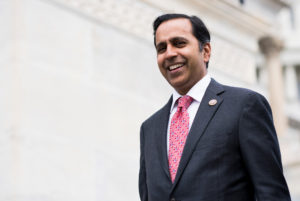Take Five: Raja Krishnamoorthi

Illinois Democrat says Obama’s election ‘illustrated the goodness of the electorate’
Freshman Rep. Raja Krishnamoorthi, 44, an Illinois Democrat, talks about his relationship with former President Barack Obama, growing up in public housing and his father’s wish for him to be an engineer.
Q: What has surprised you about Congress so far?
A: What’s really interesting is how impressive the members are as individuals on both sides of the aisle in terms of their life accomplishments and their dedication to their constituents. Basically, for all of the controversial aspects of Washington, D.C., and its outside portrayal, I’m pleasantly surprised by how I believe that each person is trying to do the right thing. It’s just that we hold some principles that sometimes clash with each other, and so we have to embark on compromise, which is a little tough around here to do sometimes.
Q: You worked on former President Barack Obama’s race for the U.S. House. How did you get on board?
A:I remember that very vividly. I remember getting on a phone call with him in 1999 where he’s like, “Yeah, I’m thinking about running for Congress.” And I said, “Against who?” And he said, “Bobby Rush.” And so I was like, “OK, sign me up for that.”
That was an ill-fated congressional race, but then in 2002, he said, “I’m thinking about running for U.S. Senate.” And I said again, “Sign me up.” Obviously, we all know what happened on that try.
Q: How did that affect your decision to get into politics?
A: [Obama’s race] really inspired me to think about running for office, because I didn’t know how people would view someone like myself running for office. I have an interesting name, as you can tell. There are 18 letters in there, in case you were wondering. Yet that race really illustrated the goodness of the electorate. The fact that Barack Hussein Obama became president is historic, to say the least. Actually, to become U.S. senator, that was historic, and then what he did later on — that’s what inspired me to think about running for office.
Q: In college you studied mechanical and aerospace engineering. What did you originally want to do?
A: Well, my father said I could do anything I wanted to do in life. I said, “Really?” And he said, “Yeah, you could do mechanical engineering, civil engineering, electrical engineering or computer engineering.”
In terms of what I wanted to do before I got into politics, I was a businessman. I ran a company that makes and sells infrared night vision military technology and solar technology, so I wanted to grow that company and pursue groundbreaking technology in each of those areas.
Q: After you came to the U.S. from India with your parents, you lived in public housing. How do you think that shaped your perspective?
A: We originally lived in normal housing, but we went through a little bit of a struggle, and then ended up in these programs like food stamps and public housing. I think the perspective it offers me is that I’ve really been in the shoes of folks who are struggling, and so I remember that. That stays with me every day.
Growing up, after my father got a job in, of all places, Peoria, Illinois, pretty much every night — because it was incessant — he would tell my brother and me, “Whatever you guys do, you make sure that this country is there for the next families that need it.” That’s how important those programs and others were to my family’s well-being. So that was the North Star for my life.
Quick Hits
Last book read: “The Alchemist” by Paulo Coelho.
Last movie seen: “The Hunt for Red October” with my sons.
Favorite song of all time: Anything U2, but “Beautiful Day” ranks up there.
Role models: My parents.
Closest to in Congress: Many members of the freshman class, but I don’t want to out them for fear of giving them a challenge.
Author: Alex Gangitano
Original Article
